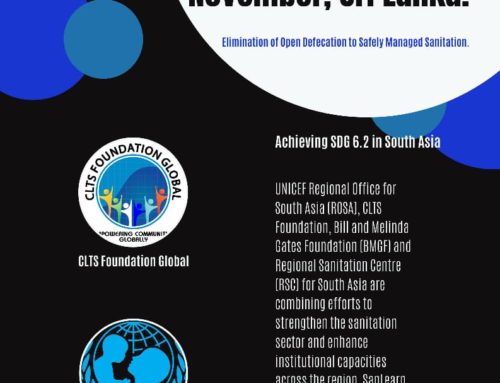Dr. Kamal Kar, the founder of the Community-Led Total Sanitation (CLTS) approach, shared his experiences and insights on community-led development, reflecting on the need for sustainable sanitation solutions. Dr. Kar discussed the shortcomings of traditional aid models and highlighted the successes of empowering communities to take charge of their own development. His latest book, “Institutional Triggering,” explores how institutions can support community-driven development on a larger scale.
Global Approach to Sanitation
Based in Kolkata, India, Dr. Kar is the Chairman of the CLTS Foundation. He developed the CLTS approach in Bangladesh in the early 2000s, shifting the focus of sanitation programmes from providing infrastructure to promoting behaviour change. CLTS encourages communities to stop open defecation through collective action without relying on external subsidies.
“CLTS isn’t only about putting up toilets,” Dr. Kar said. “It’s really about helping people change their habits and making those changes last.” Dr. Kar explained. He reflected on how earlier models, which focused on subsidising toilets, often failed because they didn’t tackle the underlying behaviour issues.
“Millions of subsidised toilets were built around the world, but more than 70% were unused or repurposed. The real issue wasn’t about building toilets—it was about changing behaviours,” he said. Governments and organisations have since adopted the CLTS approach in over 73 countries, including UNICEF and the World Bank.
The Importance of Behaviour Change
Dr. Kar shared an anecdote from his work in Zambia, where he met a man who proudly showed him a newly constructed toilet but admitted he didn’t use it. The man explained that the toilet was too valuable to use.
“He told me, ‘This is the most valuable possession I have. I live in a mud-walled, thatched-roof house. How can I use a brick building with an iron roof as a toilet?’” Dr. Kar recalled.
“It’s about addressing the cycle of contamination. Communities need to change their attitudes and behaviours around sanitation,” Dr. Kar explained. CLTS focuses on ensuring that communities themselves are engaged in the process, which leads to long-term, sustainable improvements in public health.
A Longstanding Partnership
Vita and Dr. Kar have been collaborating for more than two decades. Their partnership in East Africa has focused on implementing CLTS in rural communities and promoting behaviour change. Through their work together, villages have become Open Defecation Free (ODF), and improved cookstoves have been introduced, enhancing health and environmental outcomes.
“We began in two villages where CLTS was introduced and scaled up. The approach spread organically within a year as neighbouring communities saw and adopted the results,” Dr. Kar said.
Improved cookstoves were also introduced. “The stoves reduced fuel consumption and harmful smoke exposure, making a significant difference in the health of women and children,” Dr. Kar noted. Vita supported local entrepreneurs to manufacture and distribute the stoves, ensuring their availability to the wider community.
Expanding the Approach
Dr. Kar’s latest book, Institutional Triggering, outlines how institutions can adopt and promote the principles of CLTS to drive sustainable development at a larger scale.
“Some institutions have moved away from providing subsidies, but many still rely on them, which can perpetuate dependency,” Dr. Kar said. His book calls for a shift in how institutions approach development, moving from dependency models to those encouraging community empowerment. “It’s about creating the conditions for community-driven change,” he explained.
By ‘triggering’ institutions to support this shift, Dr. Kar hopes to see a wider adoption of community-led approaches, similar to the success of CLTS in villages.
The Future of Community-Led Development
Dr. Kar is hopeful about the future of community-led development. “When communities are empowered, they can achieve outcomes that go beyond what was initially expected,” he said. Vita continues to work alongside Dr. Kar and the CLTS Foundation, particularly in Ethiopia, where they aim to introduce improved cookstoves to 1.5 million households in the coming years. This initiative is expected to conserve biomass and improve reforestation and health outcomes for millions of people.
Dr. Kar shared valuable insights on the importance of community empowerment and behaviour change in achieving sustainable sanitation and development. His partnership with Vita has helped drive these efforts, and his work continues to influence how institutions and communities address sanitation challenges. As CLTS and similar approaches continue to expand, the focus remains on empowering communities to lead their own progress.
Listen to Dr. Kar’s Vita Voices podcast episode




Leave A Comment